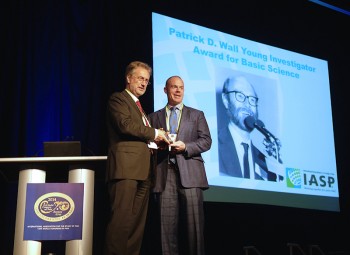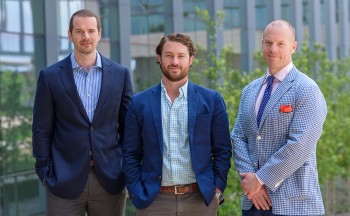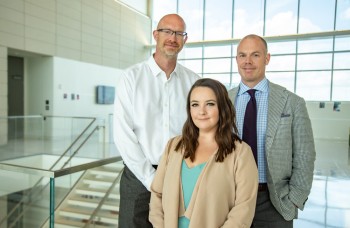
Theodore Price
Research Interests: Molecular characterization of human pain-sensing neurons; chronic pain mechanisms; development of novel pain therapeutics
Professional Preparation
McGill University - 2007
University of Texas Health Science Center at San Antonio - 2004
University of Texas Health Science - 2003
University of Texas at Dallas - 1997
Research Areas
Research Interests
Pain Research in the Price Lab
Pain serves a vital teaching function because it instructs organisms to avoid harmful stimuli. Pain plasticity is likewise a key feature of complex nervous systems because it signals for an organism to protect an injured area until the healing process has run its course. While these pain amplification mechanisms frequently resolve following healing, they can persist manifesting as chronic pain conditions. Moreover, chronic pain conditions (e.g. migraine headache) can arise without any apparent precipitating stimulus. Unfortunately these chronic pain conditions are poorly treated by current therapies creating an enormous burden of suffering with an economic impact estimated to be greater than diabetes, heart disease and cancer, combined! Hence, there is a great need to better understand mechanisms driving chronic pain and tailored therapeutic approaches that can reverse this aberrant plasticity.
Our laboratory is interested in the fundamental principles underlying pain plasticity. Our goal is to develop novel therapeutics based on these discoveries with the potential to either prevent the development of or permanently reverse chronic pain states. We focus on two major areas: 1) plasticity in peripheral nociceptive neurons following injury and, 2) plasticity in central nervous system circuits that results from persistent stimulation of peripheral nociceptors. We utilize molecular, biochemical, genetic, behavioral and electrophysiological techniques combined with an overarching interest in pharmacology and drug discovery to tackle this problem.
Publications
Appointments
University of Texas at Dallas [2014–Present]
University of Arizona [2012–2014]
College of Medicine
University of Arizona [2010–2014]
College of Medicine
[2010–2014]
Interdisciplinary Program in Neuroscience
University of Arizona [2007–2012]
College of Medicine
Additional Information
Endowed Profile
Ashbel Smith ProfessorHonors and Awards
- College Honors List (University of Texas at Dallas), 1994 Spring, 1996 Spring and Fall.
- Nortel Scholar (University of Texas at Dallas), 1995
- Runner-up Alamo Chapter for Neuroscience poster contest, 1999
- Committee for Graduate Studies UTHSCSA Student Representative, 2002-2003
- Cover Art for Neuroscience Vol 120(1), 2003
- McGill Pain Day Organizing Committee, 2006-2007
- Vice President, Quebec Network of Junior Pain Investigators, 2006-2007
- American Pain Society Future Leaders in Pain Research, 2006-2007
- AAAS/Science Program for Excellence in Science Award Recipient, 2007
- First Prize, McGill Anesthesia Research Day, 2007
- American Pain Society Nominating Committee (elected position), 2008-2009
- American Pain Society Basic Science SIG Co-Chair (elected position), 2009-2011
- American Pain Society John C. Liebeskind Early Career Scholar Award, 2011
- Louis J Kettel Faculty Mentor Award from Department of Surgery, 2011
- University of Texas at Dallas Buhrmester Rising Star Award, 2012
- Vernon and Virginia Furrow Award for Graduate Education, University of Arizona, 2012
- Patrick D. Wall Young Investigator Award, International Association for the Study of Pain 2014
Service Outreach
Local / State Outreach- High School Underrepresented Student Summer Research Program, 2009-2012
- University of Arizona Faculty Small Grants Review Panel, 2009
- University of Arizona Faculty Small Grants Review Panel, Chair, 2011
- Member, Society for Neuroscience
- Member, American Pain Society
- Member, International Association for the Study of Pain
- Founding Member, Quebec Network of Junior Pain Investigators
- Contributing Editor: European Journal of Neuroscience, 2008-present
- Associate Editor: Pain, 2008-present
- IASP small grants review panel, 2008
- Wellcome Trust Review Panel, 2009
- NIH / NIDA CEBRA study section ad hoc reviewer November 2009
- NIH / NIAAA study section ad hoc reviewer April 2010
- The Louise and Allen Edwards Foundation (Montreal) grant reviewer, 2010 - present
- American Pain Society 2011 (Austin, TX) Conference Planning Committee
- NIH / NIDCR SEP for RFA-DE-11-001, October 2010
- NIH / NCCAM Centers for Excellence in Pain Research Program Project, November 2010
- NIH /NIDA CEBRA study section reviewer March 2012
- NIH / NIDCR SEP March 2012
- NIH SCS Study Section Oct 2012, Jan 2014
- NIH/NIDA CEBRA reviewer January 2013, Jan 2014
- NIH SEP June 2013
- Academic Editor, PLoS One: 2012-present
- Editorial Board, Molecular Pain: 2012-present
- Pharmacology Section Editor, European Journal of Pain: 2013-present
- Chair of IASP Futures Task Force: 2013
- Member Organizing Committee IASP Buenas Aires 2014 Congress
- Co-chair APS Organizing Committee, Tampa 2014 Congress
- Chair APS Organizing Committee, Palm Springs 2015 Congress
- Member Organizing Committee, NeuPSIG, France 2015 Congress
- Marina Asiedu Ph.D. Committee (primary advisor)
- Lindsey Millard Ph.D. Committee
- Dipti Tillu Ph.D. Committee (primary advisor)
- Jin Yan Ph.D. Committee
- Xiaomei Wei Ph.D. Committee
- Katherine Hanlon Ph.D. Committee
- Alysia Ondoua Ph.D. Committee
- Alec Okun Ph.D. Committee
- Lauren Slosky Ph.D. Committee
- Emily Goldberg Ph.D. Committee (Immunobiology)
- Department of Pharmacology Executive Committee, 2010-
- Department of Pharmacology Admissions Committee, 2010-
College Committees
- Education Policy Committee, 2009-
- Tucson Education Policy Committee, 2010-
- Dean’s Council of Faculty Affairs Committee, 2010-
- Chair of College of Medicine Space Committee, 2011-
- None
- Outside committee member for Andrea Bailey, McGill University, Department of Pharmacology, Ph.D. Dissertation Committee, 2009
- American Pain Society Public Policy Committee, 2009 – 2011
- Outside committee member for Anna Taylor, McGill University, Department of Pharmacology, Ph.D. Dissertation Committee, 2010
- American Pain Society 2011 (Austin, TX) Conference Planning Committee
- American Pain Society Awards Committee for 2012 Conference
- Outside committee member for Celine Heinl, Medical University of Viena, Ph.D. Dissertation Committee, 2012
- Outside committee member for Zahra Shafiei, McGill University, Faculty of Dentistry, Masters Thesis, 2012
News Articles
Neuroscientist Earns Young Investigator Award from Pain Study Group
 Dr. Theodore Price recently received a young investigator award from the International Association for the Study of Pain. Price joined the faculty of the School of Behavioral and Brain Sciences as an associate professor this year.
Dr. Theodore Price recently received a young investigator award from the International Association for the Study of Pain. Price joined the faculty of the School of Behavioral and Brain Sciences as an associate professor this year.The Patrick D. Wall Young Investigator Award for Basic Science honors young, independent researchers in the field of pain. Wall was a British neuroscientist renowned for his contributions to the understanding of the link between the brain and pain.
Business Spinoffs Help Move UT Dallas Research into Marketplace
 A company created by three UT Dallas faculty members has been awarded a small-business drug discovery grant from the National Institutes of Health (NIH). The grant to CerSci Therapeutics is one of the first drug discovery grants awarded to a University spinoff company
A company created by three UT Dallas faculty members has been awarded a small-business drug discovery grant from the National Institutes of Health (NIH). The grant to CerSci Therapeutics is one of the first drug discovery grants awarded to a University spinoff companyThe NIH’s Small Business Innovation Research (SBIR) program is one of the multiple funding opportunities available to help UT Dallas professors who want to see their laboratory research find practical applications in business and society.
“The purpose of spinning out new companies from UT Dallas is to move technologies from the University into the marketplace and develop the technology to a point where larger companies might become interested,” said Rafael Martin, interim vice president for research.
Professors Delve into Mysteries Behind Chronic Pain, Migraines
Two new UT Dallas faculty members will work together to unlock the mysteries surrounding migraine headaches — a condition affecting nearly 15 percent of the world's population.Drs. Gregory Dussor and Theodore Price have collaborated for the last 14 years to better understand the exact mechanisms behind migraines and chronic pain.
“Migraine was recently ranked as the third-most prevalent disease on the planet and eighth on the list of most disabling diseases. Approximately 36 million Americans suffer from migraine and it is three times more prevalent in females than in males,” Dussor said. “Despite these numbers, there are very few scientists in the U.S. studying migraine and progress on new therapies is slow.”
Diabetes Drug Shows Promise for Chronic Pain
 Scientists seeking an effective treatment for one type of chronic pain believe a ubiquitous, generic diabetes medication might solve both the discomfort and the mental deficits that go with the pain.
Scientists seeking an effective treatment for one type of chronic pain believe a ubiquitous, generic diabetes medication might solve both the discomfort and the mental deficits that go with the pain.“People who are in constant pain have problems thinking straight sometimes. The longer you’re in pain, the more entrenched the impairment becomes,” said Stephanie Shiers, a fourth-year cognition and neuroscience doctoral student at The University of Texas at Dallas and lead author of a study recently published in the Journal of Neuroscience. “These impairments aren’t addressed by existing therapeutics.”
In the study, UT Dallas researchers show how a type of chronic pain called neuropathic pain responds to metformin, one of the most prescribed medications worldwide, as well as to pain relievers gabapentin and clonidine.
Where Does Chronic Pain Begin? Scientists Close In on Its Origins
 A new study by researchers at The University of Texas at Dallas, UT MD Anderson Cancer Center, UT Health Science Center at Houston and Baylor College of Medicine has produced evidence of the source of chronic pain in humans, revealing several new targets for pain treatment.
A new study by researchers at The University of Texas at Dallas, UT MD Anderson Cancer Center, UT Health Science Center at Houston and Baylor College of Medicine has produced evidence of the source of chronic pain in humans, revealing several new targets for pain treatment.The paper — published March 19 in Brain, one of the world’s oldest neurology journals — examined specialized nerve cells clustered near the base of the spine. Researchers took advantage of an exceedingly rare opportunity to study these nerves, called dorsal root ganglia (DRG), removed from cancer patients undergoing surgery at MD Anderson.